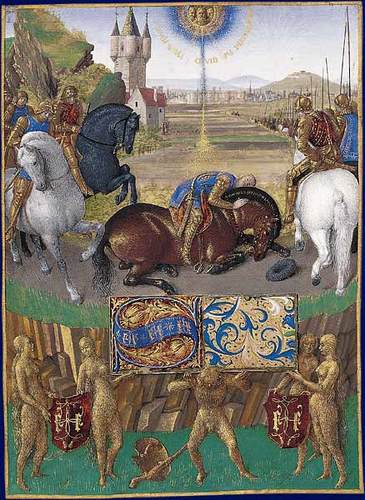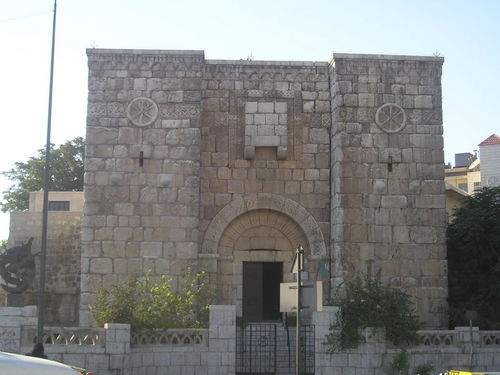
St. Paul's Spiritual Experience On The Road To Damascus
After going without food for three days and three nights in
Damascus, (See What Can One Person Do? Part 1) Ananias, a devout Jew, comes to him.
Acts 22:11 My companions led me by the hand into Damascus, because the brilliance of the light had blinded me.12 "A man named Ananias comes to see me. He is a devout observer of the law and highly respected by all the Jews living there. 13 He stands beside me and says, 'Brother Saul, receive your sight!' And at that very moment I was able to see him. 14 "Then he said: 'The God of our fathers has chosen you to know his will and to see the Righteous One and to hear words from his mouth. 15 You will be his witness to all men of what you have seen and heard. 16 And now what are you waiting for? Get up, be baptized and wash your sins away, calling on his name.'

From Damascus Paul goes to Saudia Arabia, where he stays three years, supposedly for his safety; but perhaps also to allow him to restudy the foretelling and prophecy relating to the coming of Christ in the ancient scriptures. It also is probably during this time that he is taken up into Heaven to know the will and see the Righteous One. We know this did happen because Paul himself tells us he was taken up into heaven where he saw things of which he could not speak.

The building in Damascus from which Paul escapes with his life.
Paul then returns to Damascus, where he begins preaching the gospel of Jesus in the synagogues. But they reject his message and Paul is forced to escape at night by being lowered by a basket outside the city walls. From there Paul returns to Jerusalem.
He describes in Galatians, how three years after his conversion, he went to Jerusalem, where he met James(the brother of Jesus), and stayed with Simon Peter for 15 days (Galatians 1:13–24). According to Acts, he apparently attempted to join the disciples and was accepted only owing to the intercession of Barnabas — they were all understandably afraid of him as one who had been a persecutor of the Church (Acts 9:26–27). Again, according to Acts, he got into trouble for disputing with "Hellenists" (Koine Greek speaking Jews and Gentile "God-fearers") and so he was sent back to Tarsus. Barnabas decides to travel with him.But Paul is driven to spread the word.

Paul's First Missionary Trip
Paul’s first missionary journey begins in Acts 13 in Antioch in approximately AD 47. During this period the Christian church here grew in prominence partially due to Jewish Christians fleeing from Jerusalem.[23] The Holy Spirit, speaking through one of the prophets listed in Acts 13:1, identifies Barnabas and Saul to be appointed “for the work which I have called them to.†The group then releases the pair from the church to spread the Gospel into the predominantly Gentile mission field. The significance of the Holy Spirit selecting him can be seen in Galatians 1:1 when Paul states that he is made an apostle “not through man, but through Jesus Christ and God the Father.â€
Traveling via the port of Seleucia Pieria, Barnabas and Saul’s initial destination is the island of Cyprus of which Barnabas had intimate knowledge, as he grew up there Acts 4:36. Preaching throughout the island, it is not until reaching the city of Paphos that they meet the magician and false prophet Bar-Jesus, described by Luke as “full of deceit and all fraudâ€. As was s often the custom, the sorcerer was in the company of the pro council or governor, Sergus Paulus. The two rebuke the magician, causing him to go blind and, upon seeing this Sergius Paulus, is astonished at the teaching of the Lord.
Having left Cyprus, Saul exchanges his Hebrew name for the more appropriate Greco-Roman name of Paul for ministering to the Gentiles. It is also here that their helper John Mark departs them - an act which later becomes a source of much tension between Paul and Barnabas and ultimately leading to their split in Acts 15:36-41. The two then set about strategically preaching to major cities as they make their way across the provinces of Asia Minor. A noticeable pattern begins to develop: after successfully speaking to the people in an area, the local Jews become apprehensive resulting in hostility which eventually forces them to move on.
An example of this can be seen in Antioch of Pisidia. Paul’s preaching in the local synagogue spreads quickly to ensure that almost the entire city turns out to hear him speak the following week. So radical is Paul’s message of salvation for both Jews and Gentiles through the justification of the death and resurrection of Jesus, the two are expelled from the city by the jealous Jewish chief men of the city. Likewise in the subsequent city of Iconium their message splits the town population in two. Ultimately they are compelled to flee due to rising Jewish violence against them.
Traveling on to Lystra where no mention is made of any God fearing gentiles, it can be assumed that there was most likely no synagogue here.[24] With no formal place to preach in they come across a man who has been crippled from birth. Seeing that the man has faith enough to be healed at Paul's instruction, he gets up and walks. In spite of this the Lystrians are now convinced that the two are the human incarnation of Zeus and Hermes and proceed to sacrifice oxen before them. Paul and Barnabas are so distraught at this that they tear off their clothes and cry out to the people. Pleading with the crowd, the style of preaching becomes more basic as Lystra has no knowledge of God. Paul starts from the basics by stating that God is a living God who made the heavens, earth and seas (Acts 14:15).
Paul is then hunted by disgruntled Jews from Antioch and Iconium and is stoned to the point where he is thought to be dead. Amazingly he gets to his feet and flees to Derbe and preaches the word there. He then opts to return to the cities he visited to encourage disciples, establish churches and appoint elders. This emphasis on the role of the whole church is strengthened once at home in Antioch where he finally gathers together the unified church to report to them on all his experiences. Here he summarises the aim of his journey well, to “give God the honor and the glory†(Acts 15:4)
Part of this first missionary journey can be walked today in the Saint Paul Trail, a long-distance footpath in Turkey.
(To Be Continued)
posted on June 1, 2008 8:46 PM ()
Very, very good!! I really enjoy reading about Paul and his journeys!!

 I'm sure you know this already, but Christian apologists say that the conversion of Saul of Tarsus is one of the greatest proofs for the resurrection of Christ. Great post!!
I'm sure you know this already, but Christian apologists say that the conversion of Saul of Tarsus is one of the greatest proofs for the resurrection of Christ. Great post!!  Interesting narrative of Paul's journeys and experiences!
Interesting narrative of Paul's journeys and experiences! 


1,242 articles found [ Previous Article ] [ Next Article ] [ First ] [ Last ]
Very, very good!! I really enjoy reading about Paul and his journeys!!


I'm sure you know this already, but Christian apologists say that the conversion of Saul of Tarsus is one of the greatest proofs for the resurrection of Christ. Great post!! 
Interesting narrative of Paul's journeys and experiences! 




